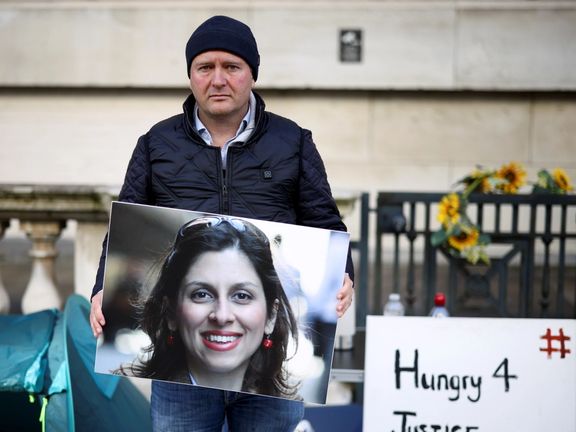British Husband Ready To Starve Himself Until Wife Returned From Iran

Richard Ratcliffe whose wife Nazanin Zaghari-Ratcliffe again faces prison in Iran, has said he will continue his hunger strike until Britain secures her return.

Richard Ratcliffe whose wife Nazanin Zaghari-Ratcliffe again faces prison in Iran, has said he will continue his hunger strike until Britain secures her return.
Ratcliffe − who has encamped since Sunday in a tent outside the entrance of the foreign office in Whitehall, London − met Thursday with Liz Truss, the foreign secretary, and Tulip Siddiq, the member of parliament for Ratcliffe’s north London constituency of Hampstead and Kilburn.
“Going on hunger strike is the absolute last resort for anyone, and Richard told me that he feels there is no other option left, because he feels our government’s response to his wife’s case has been pitiful,” Siddiq said ahead of the meeting.
Ratcliffe went on a 15-day hunger strike in 2019, which he claims led to the couple’s daughter returning from Iran, where she was staying with grandparents.
Zaghari-Ratcliffe, who had worked for the BBC World Service Trust training ‘citizen journalists’ and for Reuters-Thomson Foundation, was sentenced in April to a year in jail after conviction for spreading “propaganda against the system.” She previously served around two years of a five-year term, following conviction in 2016 on spying charges, before being given a series of furloughs.
Zaghari-Ratcliffelost an appeal against the recent sentence in September. “Instead of threatening to return Nazanin to prison Iran must release her permanently so she can return home,” the British Foreign Office said in a statement.
On Wednesday Zabihollah Kohdaeian, spokesman of the Iranian judiciary, said the one-year sentence was final but had not been referred for enforcement.
Ratcliffe insists UK ministers are "too timid" in efforts on behalf of his wife and has repeatedly linked the case to the British government’s failure to repay £400 million ($550 million) owed to Tehran after failing to deliver Chieftain tanks in the 1970s.
Ratcliffe’s disquiet with the British prime minister Boris Johnson goes back to 2017 when Johnson, then home secretary, told parliament that Zaghari-Ratcliffe was training journalists in Iran, a claim Johnson later retracted but which was cited in the legal case in Tehran.
Ratcliffe has recently charged that his wife’s plight has been considered less important than talks in Vienna designed to revive the 2015 agreement restricting Iran’s nuclear program.
“My criticism of the British government is they’ve not prioritized the safety of British citizens in the course of their nuclear negotiations, in the course of their discussions with Iran and other stuff’s been more important,” he told the BBC.
“Iran conducts its diplomatic business through hostage-taking, in part because it is cost-free,” he told the Guardian 19 September.
Former foreign secretary Jeremy Hunt told parliament Wednesday that Zaghari-Ratcliffe would not be able to leave Iran until the UK government returned the money paid for the tanks. "When are we going to repay that debt?” he asked.